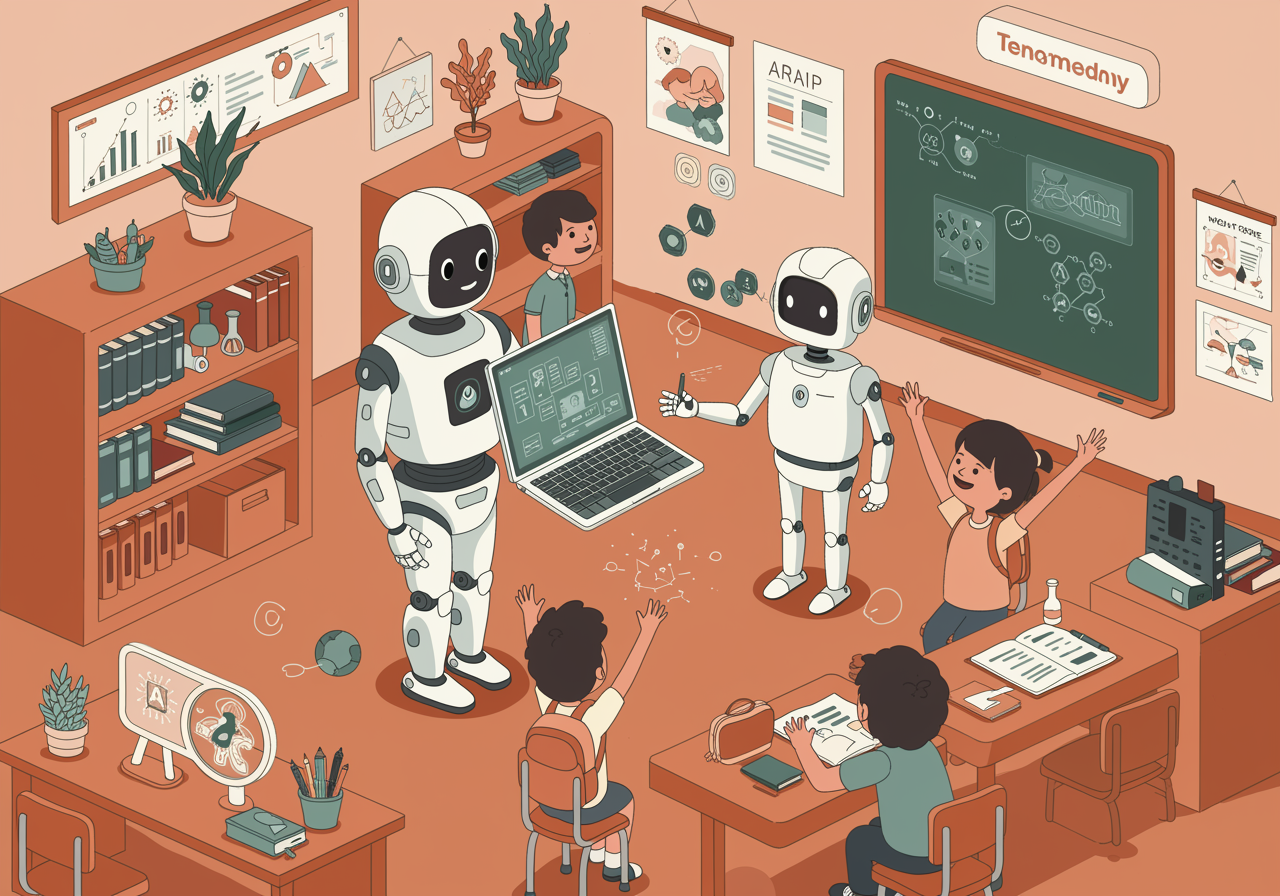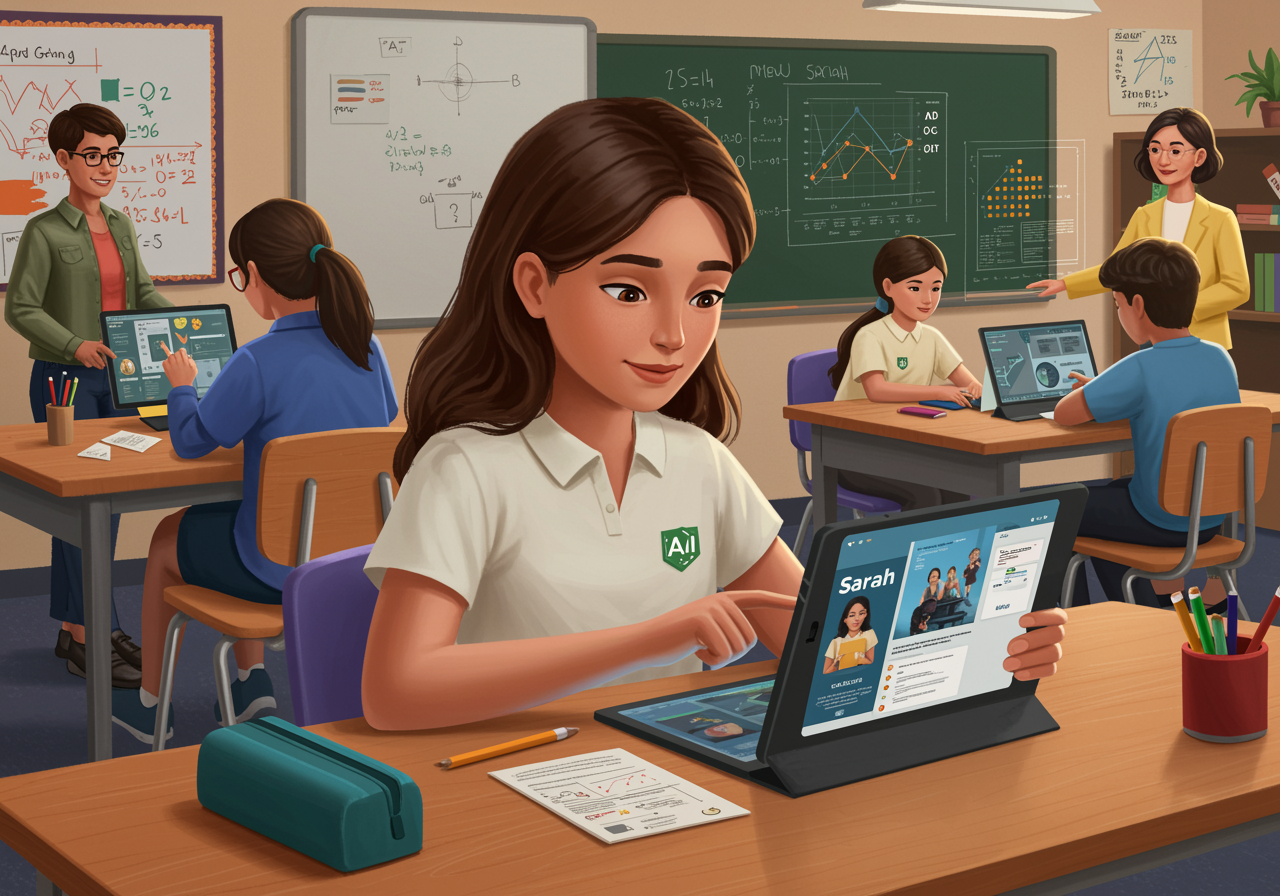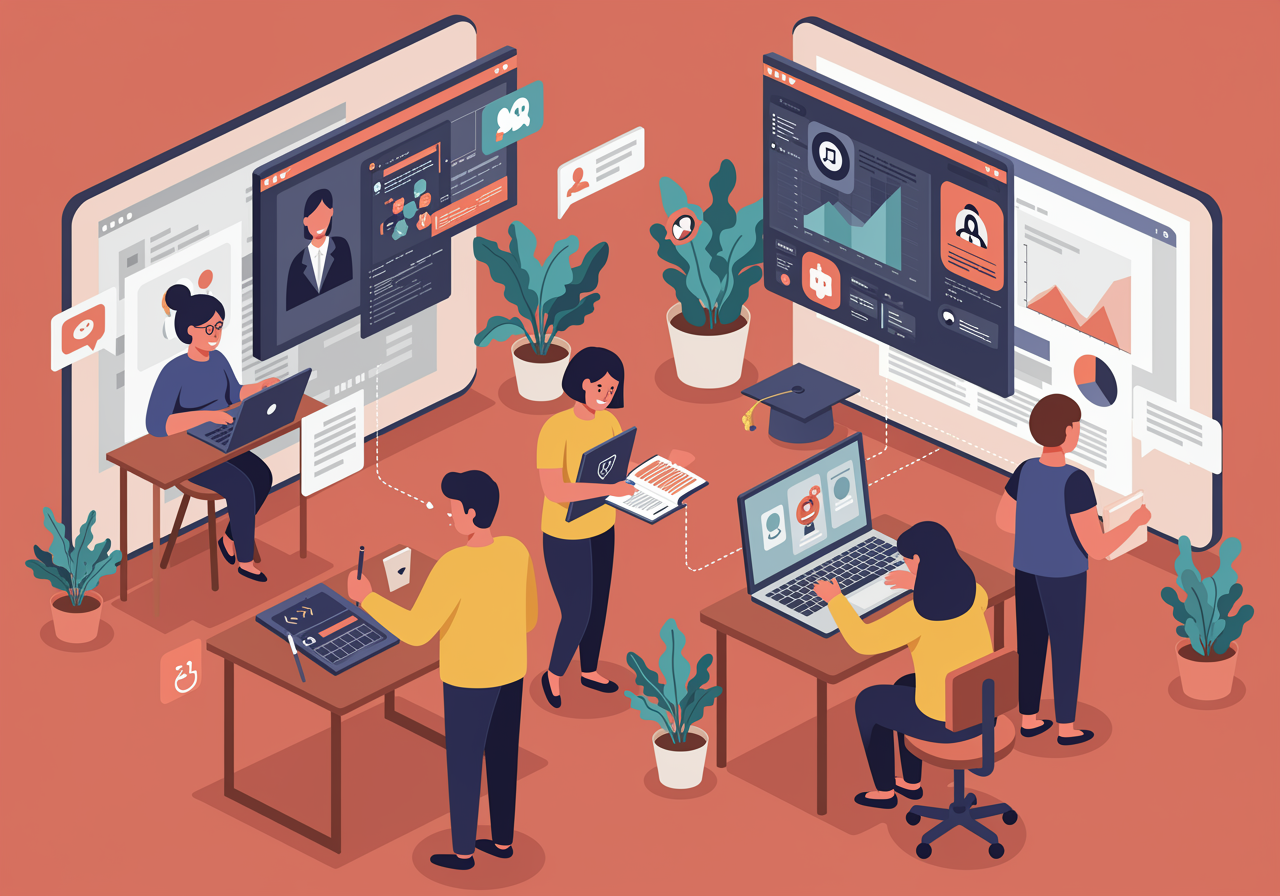AI Classroom Revolution: When Robots Become Teaching Assistants
Discover how artificial intelligence is transforming the way kids learn, one smart classroom at a time
Explore the exciting world where AI tutors, smart homework helpers, and personalized learning adventures are reshaping education as we know it.
Overview
Imagine walking into a classroom where your computer knows exactly what you need to learn next, or having a digital tutor that never gets tired of helping with math problems. AI in schools isn't science fiction anymore – it's happening right now! From apps that adapt to how fast you learn to programs that help teachers spot struggling students early, artificial intelligence is quietly revolutionizing education. Understanding how AI works in schools helps families navigate this digital learning landscape together and prepares kids for a future where human creativity and machine intelligence work hand in hand.

Understand in 30 Seconds
Get up to speed quickly
- AI = Smart Computer Helper: Artificial Intelligence is like having a super-smart computer assistant that learns about you and helps make your education more personal and effective.
- Personalized Learning Magic: AI can figure out exactly how you learn best – whether you need more practice with fractions or you're ready to zoom ahead in reading – and adjust lessons just for you.
- Teachers Get Superpowers: AI doesn't replace teachers; it gives them amazing tools to track student progress, spot problems early, and spend more time doing what humans do best – inspiring and connecting.
- Always Learning, Always Improving: The more students use AI learning tools, the smarter these systems become at helping future learners succeed.
Real Life Scenario
Situations you can relate to
Meet Sarah, a 7th grader struggling with algebra. In her math class, she uses an AI-powered learning app called Khan Academy. When Sarah gets a problem wrong, the AI doesn't just mark it incorrect – it notices she's struggling with fractions specifically and automatically suggests easier fraction problems to build her confidence. Meanwhile, her teacher gets a dashboard showing that three other students have the same issue, so she plans a mini-lesson for the next day. At home, Sarah's AI writing assistant helps her organize her thoughts for an essay, suggesting better word choices and catching grammar mistakes. Her parents can see her progress in real-time and know exactly where to offer encouragement. Think about it – how different would your school experience be if every lesson was perfectly tailored to how your brain works best?

Role Play
Spark a conversation with “what if” scenarios
What if you had an AI tutor that knew your learning style better than you do?
- Role play: One person plays the AI tutor, the other the student. The 'AI' asks questions to figure out if the student learns better with pictures, stories, or hands-on activities, then adjusts the 'lesson' accordingly.
What if AI could predict which students might drop out of school before it happens?
- Role play: Role-play a school counselor meeting with students, using 'AI insights' (patterns in grades, attendance, engagement) to offer early support and interventions.
What if AI helped create the perfect study group by matching students with complementary skills?
- Role play: Act out an AI 'matchmaker' that pairs students based on their strengths and weaknesses, creating study groups where everyone can teach and learn from each other.
FAQs
Frequently asked questions people want to know
Will AI replace human teachers?
Nope! AI is more like a super-powered teaching assistant. Teachers bring creativity, empathy, and human connection that no computer can match. AI just helps them do their job better.
Is AI in schools safe for kids' privacy?
Good schools use AI tools with strong privacy protections, just like they protect other student information. Parents should ask schools about their AI privacy policies.
What if kids become too dependent on AI for learning?
The best AI learning tools are designed to build independence, not dependence. They're like training wheels – they provide support while students develop skills to succeed on their own.
Examples in the Wild
See how this works day to day
- Duolingo uses AI to personalize language learning, adjusting difficulty and lesson topics based on individual student performance and learning patterns. (Duolingo Education Research)
- Georgia State University uses AI to analyze student data and send alerts to advisors when students show signs of struggling, increasing graduation rates by 5%. (Georgia State University Success Programs)
- Carnegie Learning's AI-powered math tutoring software adapts in real-time to student responses, providing personalized feedback used by over 600,000 students. (Carnegie Learning Research)
- Grammarly for Education helps students improve their writing by providing AI-powered suggestions for grammar, clarity, and style in real-time. (Grammarly Education Platform)
In Summary
What you should know before you start
- AI in schools acts as a smart assistant that personalizes learning for each student's unique needs and pace
- Teachers become more effective with AI tools that help them track progress and identify students who need extra support
- AI learning systems get smarter over time, constantly improving how they help students succeed
- The goal isn't to replace human connection in education, but to enhance it with powerful technology that makes learning more engaging and effective
Pro-tip for Parents
You got this!
If your child seems worried about AI 'taking over' their education, remind them that the best AI tools are designed to amplify human potential, not replace it. Compare it to how a calculator helps with math but doesn't eliminate the need to understand mathematical concepts. Encourage them to see AI as a learning partner that can help them discover their strengths and interests more quickly, leaving more time for creativity, collaboration, and critical thinking – the uniquely human skills that will always be valuable.

Keep an Eye Out For
Find these examples in everyday life
- News stories about schools adopting new AI learning platforms or digital tutoring systems
- Your child's school announcing new educational technology tools or asking for permission to use AI-powered learning apps
- Apps and websites your child uses for homework that seem to 'learn' their preferences and adapt accordingly
Explore Beyond
Look up these related research topics
- How AI is being used in other fields like medicine, entertainment, and environmental protection
- The difference between AI that helps humans vs. AI that tries to replace humans
- Careers that combine human creativity with AI technology, like data scientists and AI ethicists